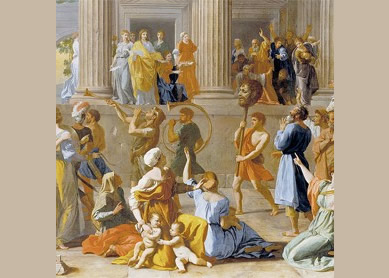Imagine being sent out for groceries by your parents, only to return home having been selected as the first king of a freshly emerging monarchy. This is how the story of Saul ben Kish begins. We first meet Saul after his father has lost a drove of donkeys. Saul’s quest to find his father’s livestock then takes a rather unexpected turn when he encounters the prophet Samuel who informs him that Yahweh has chosen him to rule over Israel. This sudden alteration of Saul’s itinerary sets him on a path to becoming a somewhat successful military leader; however, this new trajectory also sets Saul on a path toward a contentious rivalry with the young David as well as toward his family’s demise upon Mount Gilboa.
Saul: King in the north? Or, no king at all?
The current form of the biblical text of 1 Samuel would have the reader believe that Saul ruled Israel as a king prior to David successfully usurping his throne. While Saul was certainly a social and political leader of early Israel, it is difficult to determine whether or not Saul was ever actually a king. After all, there are very few passages in 1 Samuel that actually describe Saul at court, in a palace, or performing kingly activities. Instead, the lion’s share of Saul’s activities are martial in nature. Saul’s encounter with Nahash the Ammonite (1Sam 11) and his sacking of various Philistine garrisons with his son Jonathan (1Sam 13:2-3; see 1Sam 14:6-15) serve as prime examples. Further, the notice of his regnal years in 1Sam 13:1 is problematic and was likely added at a much later date, leading many readers to question its reliability. (The Hebrew text that we have actually has Saul beginning his reign at one year old!) The archaeological reality of the time period when Saul would have ruled Israel—the early Iron Age, some time between the end of the eleventh and beginning of the tenth centuries BCE—is also more than a little problematic. While the Bible paints a picture of Saul leading a burgeoning political and military power, there is little archaeological evidence to support the existence of an Israelite monarchy at such an early date.
In fact, most of the texts describing Saul in 1 Samuel anticipate the successful rise of David. The description of Saul’s good looks in 1Sam 9:1-2, for example, anticipates Yahweh’s concerns in selecting a king in 1Sam 16:7—namely, that Yahweh cares not about physical appearance. Instead, Yahweh is concerned with selecting a king on the basis of their character. It seems most likely that most of the older tales describing Saul and his military excursions were inherited by scribes who favored David and edited into political propaganda against Saul and in favor of David and the Davidic line. Perhaps Saul was never king in fact and was only made to appear as one to reinforce Davidic claims for the throne.
Prophet or prophetic pawn? Who is really in charge here?
From the very beginning of Saul’s story, the careful reader can discern a close relationship between Saul and the prophetic office. There is little that Saul does that takes place outside the oversight of prophets—Samuel in particular. Saul’s quest for seeking out his father’s lost livestock is sidetracked by an initially unnamed seer who turns out—surprise, surprise!—to be Samuel. From this point until the time of his death fighting against the Philistines on Mount Gilboa, the trajectory of Saul’s story is ordered and directed by prophetic activity. He is first anointed by Samuel as “king designate” (Hebrew nāgîd) in 1Sam 10:1. Then, after the donkey tale appears to have come to a conclusion, Samuel directs a lot casting ceremony to determine Israel’s new leader in a more public setting in 1Sam 10:17-27. Indeed, here the people request a king (Hebrew melek) and proclaim Saul as such by the end of the tale. (Note, however, that this particular passage comes from a time much later than the texts that surround it and does not cast Saul in the most favorable of light.) The episode at Jabesh Gilead seems, at first glance, to have escaped the influence of the prophetic office and lacks almost any references to prophets or prophecy; the phrase “and after Samuel” in 1Sam 11:7, although probably a secondary addition to the text, serves to bring the entire episode under the watchful eye of this prominent Man of God. 1Sam 11 concludes with a transition to Gilgal—connecting the story to Samuel’s earlier directions to Saul and prepares the reader for Saul’s first rejection two chapters later. After failing to obey Samuel’s command to wait for him at Gilgal, Saul disobeys Samuel’s orders in 1Sam 13:7-15 and is denied the kingship by Samuel. After having waited the full seven days as Samuel had ordered him in 1Sam 10:8, Saul offered up a sacrifice to Yahweh, only for Samuel to jump out—almost as if he had been hiding behind some nearby bushes—to catch Saul in the act of illicit cultic activity. Similarly, Saul’s skirmish with the Amalekites and King Og in 1Sam 15 was intended to culminate with the Amalekites being put to the ban (Hebrew ḥrm). Saul spares Og, however, and is denied the kingship a second time by Samuel. Saul’s origin story is almost entirely directed by prophetic activity at every turn. Relatedly, an old “proverb” or saying concerning Saul (“Is Saul also among the prophets?”) and an association with prophets appears twice in 1 Samuel (1Sam 10:12 and 1Sam 19:24), which could also be understood to subordinate Saul to prophetic oversight. It is the prophet, after all, who both anoints and denounces various kings throughout the book of Samuel.




